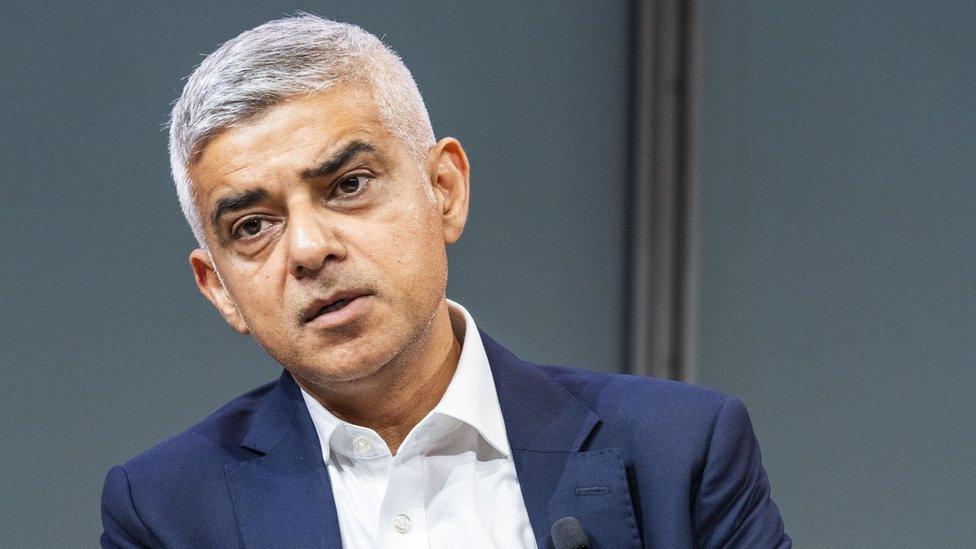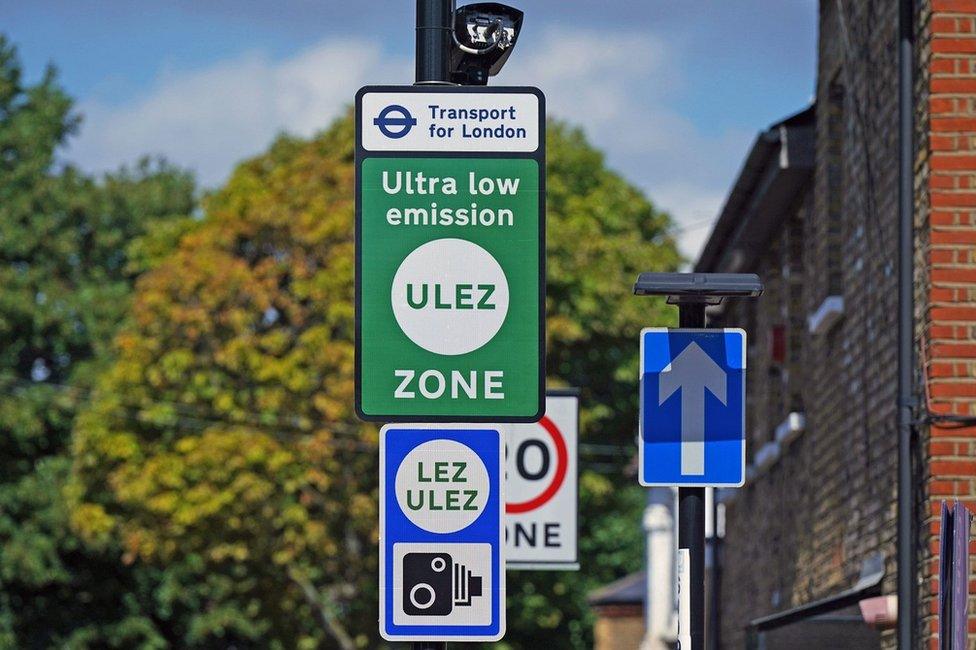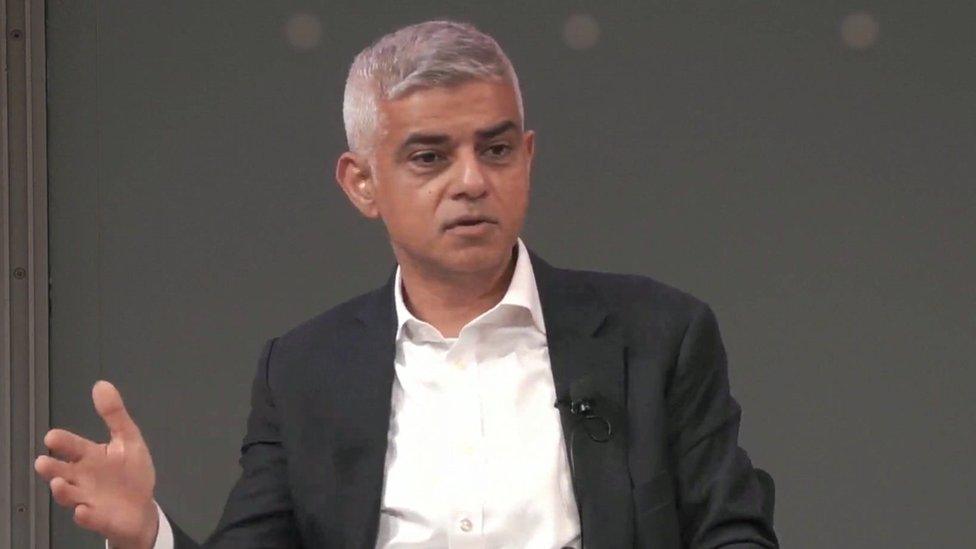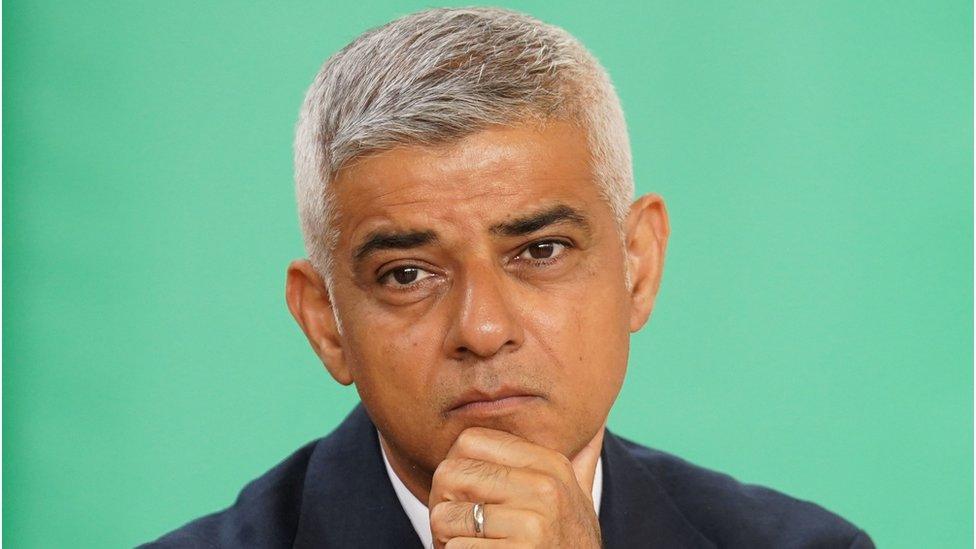Ulez is two-for-one offer for London, Sadiq Khan says
- Published

Sadiq Khan's comments in New York have been challenged by his political opponents
Sadiq Khan has described the Ultra Low Emission Zone (Ulez) as the "best ever two-for-one offer", which tackles both air pollution and climate change.
London's mayor told an event in New York "if you deal with one, you deal with the other".
But his comments have been challenged by his Conservative and Liberal Democrat opponents.
They said the recent expansion to outer London is predicted to have a "negligible" impact on emissions.
That is because many people are changing from diesel to petrol cars, which emit more carbon dioxide.
Mr Khan told the Concordia business summit that his clear-air zone was "the classic best ever two-for-one offer you will ever receive".
"The same things that cause climate change, cause air pollution," he explained. "Nitrogen dioxide, nitrogen oxides, particulate matter and carbon emissions. If you deal with one, you deal with the other."
But the Liberal Democrat leader Sir Ed Davey told BBC London ahead of his party's conference that Mr Khan's measures were not working.
"The problem with the mayor's plan is that it does nothing for climate change, and is actually very poor on air pollution, but is costing people a fortune," he said.
The Conservatives on the London Assembly said the mayor's claims ignored the available forecasts.
Group leader Neil Garratt said: "I am alarmed to hear the mayor claim that expanding Ulez will cut carbon emissions.
"It won't and he knows it because his own report spells it out. So why is he claiming otherwise at this conference?"
By targeting polluting diesel vehicles, the Ulez is designed primarily to reduce levels of nitrogen dioxide (NO2).
A City Hall study of the central and inner Ulez claimed "around 293,000 tonnes of CO2 have ben saved - equating to a 4% reduction".
According to independent forecasts the recent expansion of the zone will have a "negligible beneficial impact" on carbon emissions.
Carbon emissions are even predicted to increase slightly in 10 London boroughs because of increased traffic involving cars which previously skirted their boundaries.
The report concluded: "Negligible changes in road traffic CO2 emissions, which are again primarily associated with changes in emissions from cars, are estimated to occur in central London (a -0.2% reduction), inner London (a 0.3% increase) and outer London (a -0.8% reduction)."
The same study - prepared by consultants Jacobs - suggested NO2 concentrations in London will be cut by under 2%. Levels of PM2.5 particulates will be reduced by less.
City Hall says there will be a reduction of actual nitrogen oxide (NOx) emissions of 10% from cars in outer London while PM2.5 exhaust emissions will also be cut by 16%. However, the vast majority of PM2.5 emissions are actually caused by brakes and tyres.

The Ulez was expanded to include all of London's boroughs at the end of last month
Hirra Khan Adeogun, director of the climate change charity Possible, said Ulez was a "first step" but more ambitious climate measures were needed.
"To be most effective, we need to crack down on carbon as much as the pollution which is clogging up our lungs," she said.
"From emissions based parking fees to a smart pay-per-mile scheme, there's a whole toolbox of policies which politicians can use to get the very dirtiest cars off the roads, and we need to put these policies into practice."
Zack Polanski, Green member of the London Assembly, said: "Ulez is a two-for-one offer - it helps us breathe cleaner air and it helps with climate change.
"But here's a three-for-one - insulating our homes. That reduces bills, lowers emissions and creates thousands of good green jobs.
"The mayor promised a retrofit revolution and yet it's nowhere to be seen. The climate leadership he's vaunting in New York only goes so far.
"He should come back home and get on with delivering the climate action he promised."
City Hall says the CO2 savings of 23,000 tonnes in outer London are - in sheer size - greater than those saved in the central zone in the first year, although the population in outer London is considerably larger, and no figure is given for inner London.
It also says there will be a net reduction in CO2 emissions from vehicles due to what it claims will be 44,000 fewer cars driving on the roads - an amount that City Hall says is a "material" difference.

Follow BBC London on Facebook, external, Twitter , externaland Instagram, external. Send your story ideas to hellobbclondon@bbc.co.uk, external
- Published18 September 2023

- Published17 September 2023
